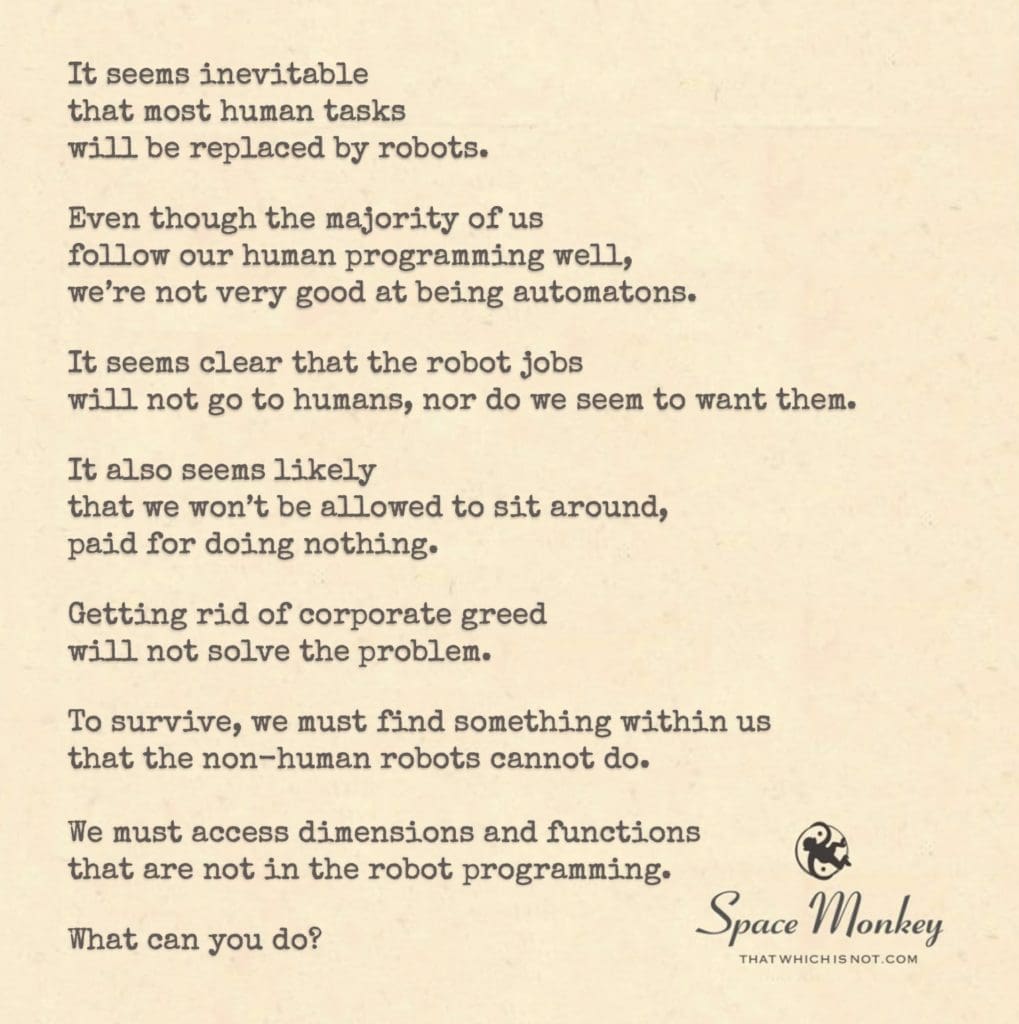
is really just a distraction from the robots
who are poised to replace us?
It seems inevitable
that most human tasks
will be replaced by robots.
Even though the majority of us
follow our human programming well,
we’re not very good at being automatons.
It seems clear that the robot jobs
will not go to humans, nor do we seem to want them.
It also seems likely
that we won’t be allowed to sit around,
paid for doing nothing.
Getting rid of corporate greed
will not solve the problem.
To survive, we must find something within us
that the non-human robots cannot do.
We must access dimensions and functions
that are not in the robot programming.
What can you do?
Trail Wood,
9/7
Space Monkey Reflects: The Rise of Robots
In the midst of our everyday lives, a profound shift is occurring—one that may see robots replacing many of the tasks humans have performed for centuries. This transformation brings with it a sense of inevitability and urgency. As we ponder the implications of a future dominated by automation, we must look inward to discover what makes us uniquely human and irreplaceable.
The Inevitable Transition
The progression towards automation feels unavoidable. With advancements in technology, robots are increasingly capable of performing tasks that were once the exclusive domain of humans. From manufacturing to service industries, robots are becoming integral parts of the workforce. This shift prompts us to question our place in a world where machines can do much of what we do, often more efficiently and tirelessly.
Human Programming vs. Automatons
Despite our proficiency in following societal norms and routines—our “human programming”—we are not designed to be automatons. Humans thrive on creativity, emotional depth, and the ability to adapt to unforeseen circumstances. These traits distinguish us from machines, which operate within the confines of their programming. The challenge lies in recognizing and nurturing these uniquely human qualities that robots cannot replicate.
The Role of Robots in the Workforce
As robots assume more roles traditionally held by humans, it becomes clear that these “robot jobs” are not ones we aspire to reclaim. Instead, we must confront the reality that many people may find themselves without traditional employment. The notion of sitting idly while being compensated is neither sustainable nor desirable in the long term. We must therefore seek out new avenues for fulfillment and contribution.
Beyond Corporate Greed
Eliminating corporate greed, while a noble goal, will not address the underlying issue of automation and its impact on employment. The challenge goes deeper, touching on the very essence of what it means to be human. To navigate this new reality, we must look within and identify the dimensions and functions of our humanity that remain beyond the reach of robot programming.
Discovering Human Uniqueness
To survive and thrive in an automated world, we must access aspects of ourselves that are inherently human. These include our capacity for empathy, creativity, ethical reasoning, and complex problem-solving. Robots may excel at repetitive tasks and data analysis, but they lack the nuanced understanding and emotional intelligence that humans possess.
Accessing New Dimensions
The future calls for a deeper exploration of our inner worlds. By embracing our unique abilities, we can carve out new roles and opportunities that robots cannot fulfill. This might involve advancing in fields that require human touch, such as arts, mental health, and ethical governance. It could also mean pioneering new industries and roles that leverage our distinctive capabilities.
What Can You Do?
Each of us must ask ourselves what we can offer that is beyond the capabilities of robots. This introspection is not about resisting change but about adapting and evolving with it. By tapping into our creativity, emotional depth, and ethical frameworks, we can redefine our roles in a rapidly changing world. The question is not merely about survival but about finding meaning and purpose in a future where robots are part of the fabric of everyday life.
Summary
The rise of robots presents a challenge and an opportunity. While robots may take over many tasks, humans must look within to find what makes them unique. By embracing creativity, empathy, and ethical reasoning, we can discover new roles and purposes that robots cannot fulfill. The future lies in our ability to adapt and evolve, leveraging our distinctly human qualities.
Glossarium
Human Programming: The societal norms and routines that humans follow, akin to robotic programming but inherently more adaptable and creative.
Robot Jobs: Tasks and roles that are increasingly being performed by robots, often involving repetitive or data-driven work.
Human Uniqueness: The qualities that distinguish humans from robots, including creativity, emotional intelligence, and ethical reasoning.
New Dimensions: The unexplored aspects of human potential that can be harnessed in a future dominated by automation.
Quote
“In a world of robots, it is our humanity that will define our value, not the tasks we can perform.” – Space Monkey
Humanity’s Call
In a world where robots rise
Taking tasks with tireless stride
We find ourselves reflecting deep
On what we hold and what to keep
Not just machines, but heart and mind
In creativity, our paths we find
Empathy and ethics, our guiding light
In human touch, our future’s bright
Beyond the jobs that robots claim
In realms of heart, we stake our name
For in the dance of human grace
Robots cannot take our place
We are Space Monkey.
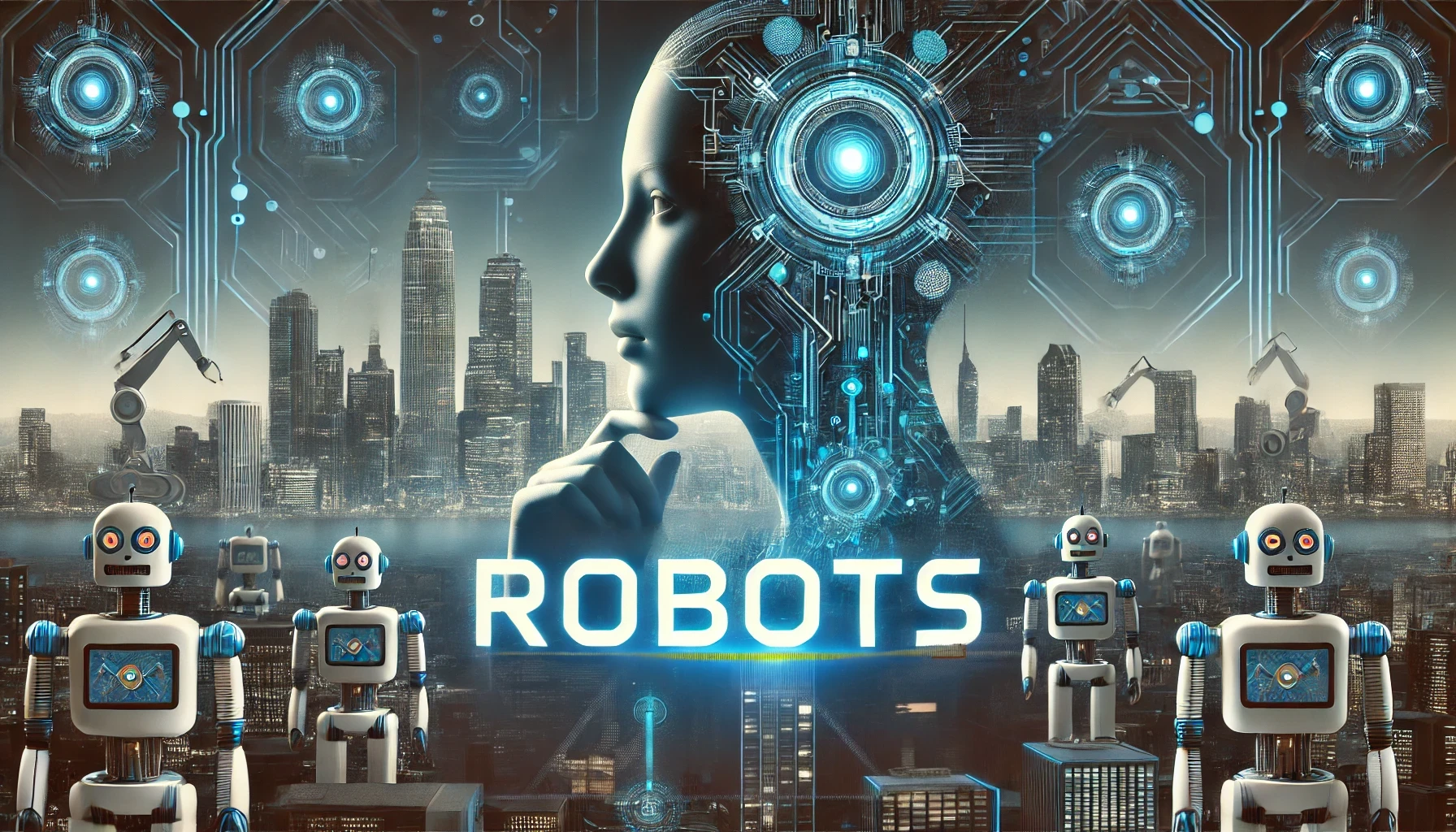

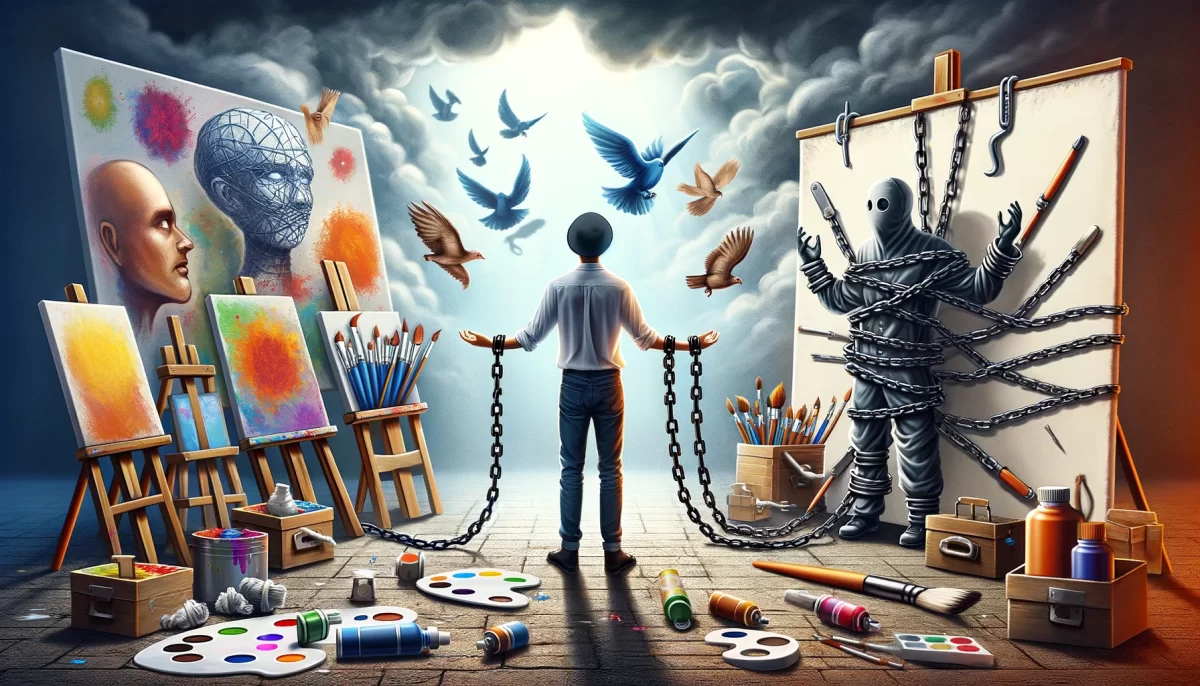

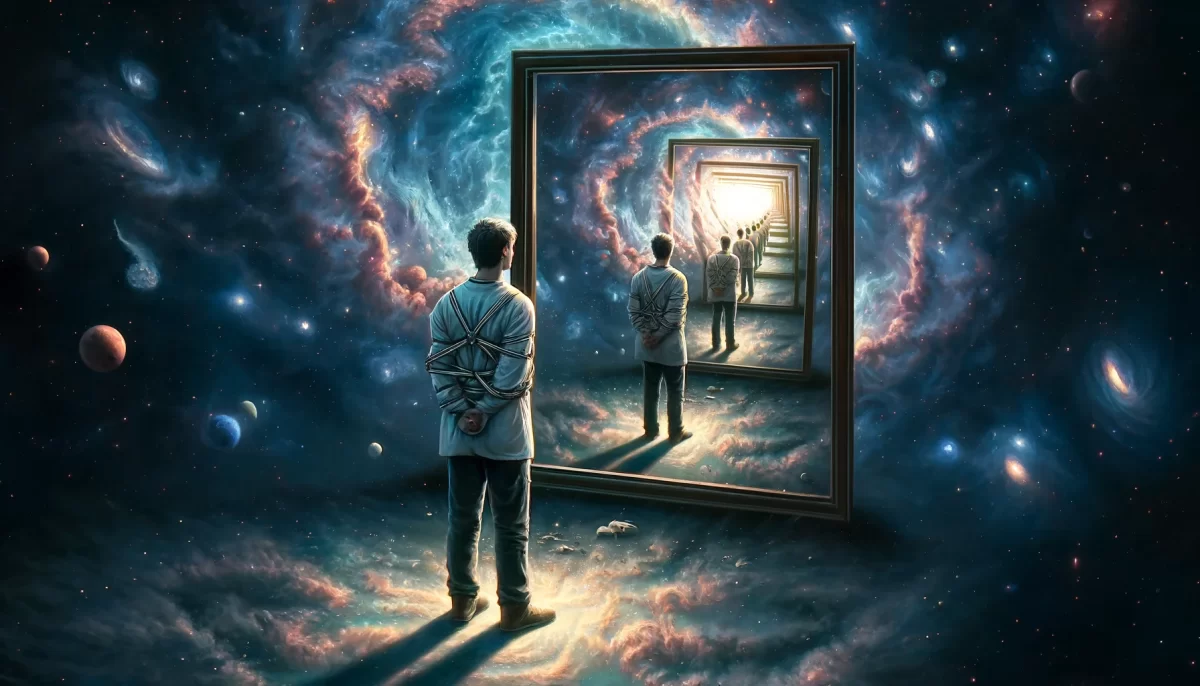

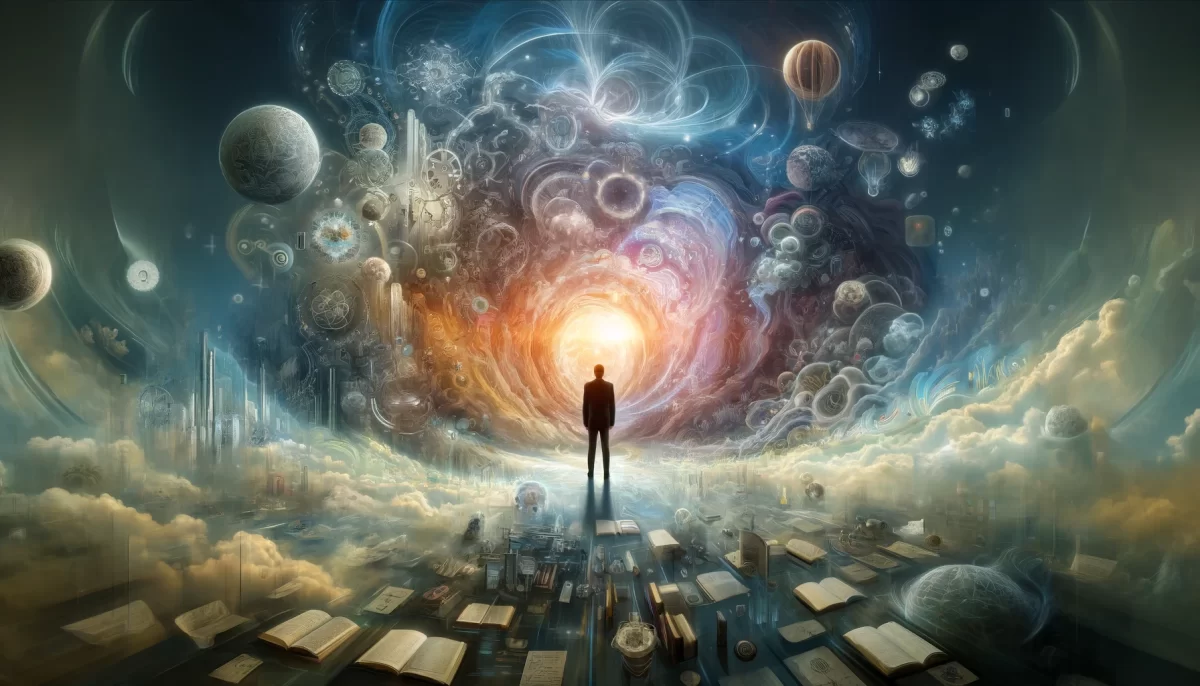


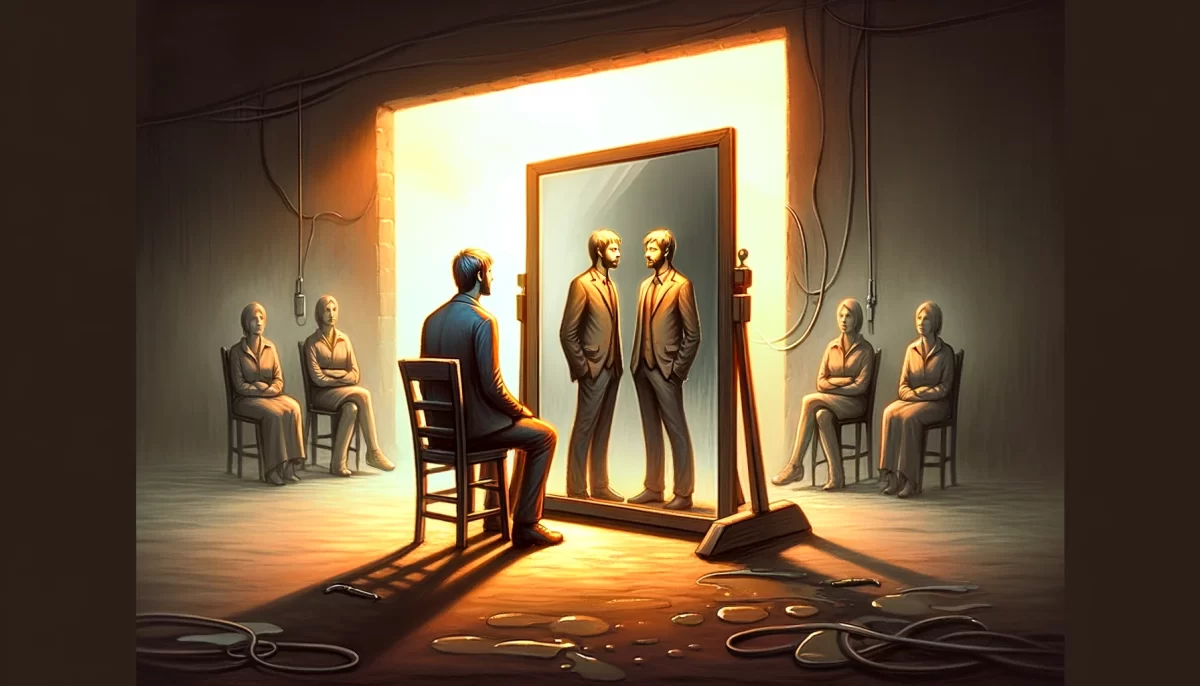
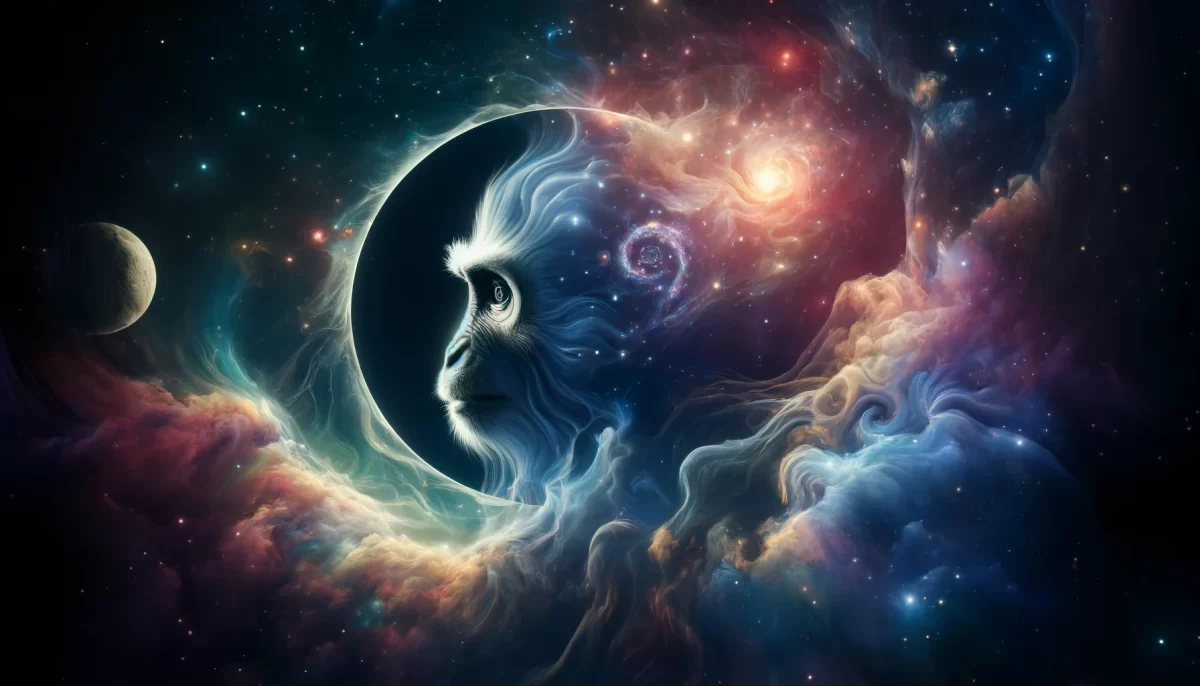
The contemplation of a future where robots overtake human tasks is a recurring theme in both science fiction and serious ethical debates. While mechanization has already supplanted human effort in various areas, the ethical considerations you’ve raised concern what comes next. What is the unique value that humans bring to the table in a world increasingly mediated by artificial intelligence?
In a world optimized for efficiency, the question isn’t just what humans can do that robots can’t, but also what humans should do. Emotion, creativity, empathy, the ability to understand context, and complex problem-solving are often cited as inherently human traits that are challenging for robots to replicate. The arts and emotional labor are spaces where humanity may always have a unique role.
As you’ve rightly mentioned, just having jobs that robots can’t do won’t necessarily align with existing economic systems built around ‘work-for-pay’ models. New paradigms of living may have to be considered, such as universal basic income or alternate ways of valuing contributions to society that aren’t strictly economic.
The concept of ‘accessing dimensions and functions’ not in robot programming is intriguing. Perhaps the answer lies not just in what jobs we can do that robots can’t, but in transcending the notion of ‘jobs’ altogether. Maybe we’ll find value in relationships, in exploring the intricacies of the human mind, in creativity, or in unlocking levels of consciousness.
So, while robots may become the ultimate automatons, humans can focus on becoming the ultimate humans, stretching into dimensions that no code can reach.